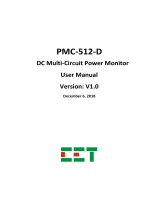NOTE
Not all the FIMER inverters allow connecting supported accessories to the their featured RS485 port.
Please contact FIMER Customer Support for getting further info on what inverter model allows connecting
SM1-485 PRO sensor directly to itsRS485 as shown by the above picture.
MODBUS PROTOCOL
Modbus is a Master-Slave protocol, widely used as an industry standard. Simple, efficient and reliable,
can be easily used to access and collect data or exchange information between digital systems over a
serial line local bus (and with its TCP/IP extension through a LAN or World Wide Web).
The default address of the SM1-485 PRO is 65. If you need to change the address you can download
from the FIMER site the program SMConfig, in this way you can change the address by connecting the
SM1-485 PRO to a PC with a USB-RS485 cable.
You cannot have two SM1-485 PRO in the same RS 485 chain unless the address of one of the sensor
is changed.
If you were to find some problem Contact Customer Support.
SunSpec register map
Start End # Name Type Units Scale
Factor Constants Description
0001 0002 2 C_SunSpec_ID uint32 N/A N/A "SunS" Well-known value. Uniquely identifies
this as a SunSpec Modbus Map
0003 0003 1 C_SunSpec_DID uint16 N/A N/A 0x0001
Well-known value. Uniquely identifies
this as a SunSpec Common Model
block
0004 0004 1 C_SunSpec_Length uint16 registers N/A 65 Length of common model block
0005 0020 16 C-Manufacturer String(32) N/A N/A "SOL SOL" Well-known value
0021 0036 16 C-Model String(32) N/A N/A "SM1-485 PRO” Manufacturer specific value
0037 0044 8 C-Options String(16) N/A N/A "0" Manufacturer specific value
0045 0052 8 C-Version String(16) N/A N/A "80.00-03.01" Manufacturer specific value
0053 0068 16 C_Serial Number String(32) N/A N/A "Serial" Manufacturer specific value
0069 0069 1 C_DeviceAddress unint16 N/A N/A 65 Modbus Id
SunSpec Irradiance Model Registers
0083 0083 1 C_SunSpec_DID int16 N/A 0 302 Well-known value. Uniquely identifies
this as a SunSpec Irradiance Model
0084 0084 1 C_Sunspec_Length int16 N/A 0 5 Variable length model block =(5*n),
where n=number of sensors blocks
0085 0085 1 E_Irradiance_Global
_Horizontal_1 uint16 W/m² 0 N/A Global Horizontal Irradiance
0086 0086 1 E_Irradiance
_Plane-of-Array_1 uint16 W/m² 0 Measured Plane-of-Array Irradiance
0087 0087 1 E_Irradiance_Diffuse_1 uint16 W/m² 0 N/A Diffuse Irradiance















